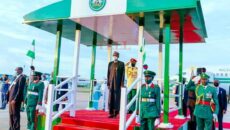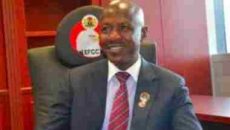By Dare Babarinsa

Twenty-two years down the road, it is necessary to evaluate and understand the centrality of Chief Moshood Abiola’s sacrifice in bringing us the Fourth Republic. Chief Abiola was the winner of the June 12 1993 presidential election whose victory was voided by the military dictatorship of General Ibrahim Babangida. It was Abiola’s and other heroes’ and heroines’ sacrifice that has given us the unbroken democratic dispensation we have been enjoying since 1999. The Abacha coup of November 1993 was a turning point in the struggle of Abiola to claim the presidency of Nigeria. With his victory in that year’s presidential election, Abiola became Nigeria’s President-presumptive and Alhaji Babagana Kingibe, the Vice-President presumptive. Then Abacha seized power and the struggle entered a new phase.
The Abacha putsch was a coup-foretold. It was indeed, a creeping coup in which somehow unwittingly Abiola may have actively participated. A few days after the coup, Chief Ebenezer Babatope, the Director of Organisation of the defunct Obafemi Awolowo’s Unity Party of Nigeria, UPN, during the Second Republic and a pillar of the Awoist Vanguard, came to my office at the then corporate headquarters of TELL, on Acme Road, Ikeja. He looked agitated.
“Abiola has collapsed,” he blurted out. He said that morning, a meeting had been held at Abiola’s residence in Ikeja, and it was resolved that the Abiola group would support the new Abacha junta. He said the resolution of the meeting was communicated to the Awoist group which was then meeting regularly at the Ikeja home of Chief Alfred Rewane, the liberal businessman and former private secretary to Chief Awolowo. He said in view of Abiola’s decision, the Awoist group would be nominating members into the new government. He said because of this, Abacha had agreed that supporters of Abiola would be nominated as deputy-governors to military governors that would soon be announced by the junta. He said most likely, Kingibe, Alhaji Lateef Jakande, the popular former Lagos State Governor and several top politicians who were close to Abiola, may also join the Abacha cabinet. He said he, Dr Olu Onagoruwa and Mrs Mobolaji Osomo, may also be joining the cabinet on the strength of a recommendation from the Awoist group.
“I do not have full details of the deal,” Babatope said. “But if Abiola intends to reclaim his mandate, he has no business allowing his supporters to join a military regime. His only deal should have been to support it until they hand over to him. If they join the government, how would they look forward to the revalidation of his mandate?” Would he [Babatope] take up the appointment if it was announced?
“I will,” he said. “I am only obeying my leaders. But if I were Abiola, I will not go the same route. Our leader, Papa Awolowo would not have agreed to that also.” Chief Awolowo died in 1987, but for Babatope, he forever remains a reference point.
Babatope left me puzzled and troubled. Few days earlier, we saw on national television, the fuzzy footage of Abiola’s visit to Abacha in Lagos. We were told later that he was accompanied on that visit by many of his top supporters including Kingibe, Jakande and a young Senator from Lagos, Bola Ahmed Tinubu, who was said to have been promised the post of deputy-governor. Few days later, Babatope, and other nominees of the Awoist group and the Abiola group were appointed ministers. Abacha reneged on his promise to appoint civilian deputy governors and he was determined to do worse.

MKO Abiola at Abuja High Court in 1994
In the early days of the regime, Babatope, Osomo, Alex Ibru publisher of The Guardian and Minister of Internal Affairs and Onagoruwa were briefing the meeting at Rewane’s house regularly. In the end, most of them, claiming they were occupied with state assignments, were not showing up. It was also clear that they were under serious security watch. I went to see Papa Rewane with my friend, Funminiyi Afuye, (Baba Abraham Adesanya nicknamed him Afemo!) to complain about the turn of events. We had not formed Idile Oodua then, but we had an informal group which included the likes of Engineer Adebayo Adenekan, Ademola Oyinlola, my colleague in TELL, Kayode Anwo, an engineer, Biodun Bamkefa, also an engineer and now a pastor, Paschal Idowu, an insurance executive, Prince Adedokun Abolarin, lawyer (now Kabiyesi, the Orangun of Oke-Ila, Osun State) and Barrister Rotimi John. Papa Rewane said the Awoist group cannot refuse to collaborate with the Abacha junta if Abiola was in league with the regime.
How to actualize Abiola’s victory had been a matter of contention among his supporters, especially those of us who were ready to join the fray. In the wake of the June 12 annulment, there were many theories and suggestions on which road to take. One of the biggest supporters of Abiola originally was General Olusegun Obasanjo, the retired military ruler who was then living on his farm in Otta, Ogun State. After the election, my colleagues at TELL, Nosa Igiebor, Editor-in-Chief and Kolawole Ilori, Executive Editor, visited Obasanjo in his farm house. He was on the phone much of the time monitoring results state by state.
“This is a great day for Nigeria,” he told them. “Abiola is going to be President. The reputation of the military has been saved.”
After the annulment was announced, I went to Otta in the company of Dele Omotunde, the deputy Editor-in-Chief of TELL. Obasanjo was in a bellicose mood. “Annulment or no annulment, Babangida must leave by August 27,” he said. “He made the promise, he has to keep it!”
Then through a convoluted route that involved serious pressure from General Obasanjo, the military led by General Sani Abacha, the political class led by Abiola and his old friend and later rival, Major-General Shehu Musa Yar’Adua, the civil society, led by Beko Ransome-Kuti and Gani Fawehinmi as well as the Press, Babangida “stepped aside” on August 27, 1993. He left power in the powerless hand of an Interim Government led by Chief Ernest Adegunle Shonekan, a corporate titan who was at sea in the turbulent terrain of Abuja high-wire politics.
After Shonekan’s ascension, my colleagues in TELL, Igiebor, Onome Osifo-Whiskey, the Managing Editor, Ilori, and Ayo Akinkuotu, the Senior Associate Editor, who had earlier been captured “as prisoners of war” by the agents of the Babangida dictatorship, were released. Few days later, Shonekan sent a message that he would like to see us and we asked Ilori and Osifo-Whiskey to go. They met Shonekan, who sought some understanding from the media at the Akinola Aguda House, Abuja. The denizens of the Aso Rock Presidential Villa claimed they were refurbishing the Presidential Palace and would not allow Shonekan to move in. Also in extending a hand of fellowship, the ING head equally invited Fawehinmi and Beko Ransome-Kuti. At their meeting, he asked if they would like to drink tea. Shonekan called the steward and ordered for tea. The tea was never brought until the meeting ended 40 minutes later. This among several other incidents showed how powerful Shonekan was!
Yet some of our leaders were ready to invest him with possibilities. At another meeting elsewhere, one of our leaders said the public opposition to Shonekan would not work in our interest. “We need to support Degunle (Shonekan) to stabilize the country and conduct another presidential election,” he said. “The alternative would be military rule.”
“If they refuse to install Abiola, we will go to war,” one of us shot back. “We don’t want military rule again.”
“You don’t know war,” the big man replied. This is war: “You send 10 of your best reporters to go and cover a story in Maiduguiri. Five of them are killed, three are wounded and only two returned home. Then you are requested to send another batch of 10 reporters to Maiduguri and all the ten are killed. That is war!”
We did not agree with him. Few days later, I tried to no avail to see Chief Abiola. I complained to General Alani Akinrinade, who advised that I should see Otunba Olabiyi Durojaiye, former presidential aspirant on the platform of the Social Democratic Party, SDP, who was destined for the gulag under General Abacha. Durojaiye linked me up with Kudirat, Abiola’s senior wife who advised me to come 8 a.m the following morning. Sure enough, I met Abiola the following day by 8 a.m. I told him the advice of the big man that he should cooperate with Shonekan so that another presidential election can be held. Abiola shook his head and said this was unacceptable.
“I did not vote for myself,” he said. “Nigerians voted for me. I have already won the presidential election. You cannot re-sit for an exam you have already passed.”
Indeed at that point, Abiola’s options were limited. He had expended a huge amount of his personal vast fortune on the 1993 presidential elections. I do not know of any group of Nigerians that donated money to Abiola’s campaign. He funded it virtually singlehandedly. To ask him to ‘re-sit for the exam,’ would have been very difficult considering the resources still available to his opponents, especially the enigmatic Major-General Yar’Adua and the shadowy elements in the military bent on stopping him at all cost.
I gave him a one page recommendation from our own group. He should continue to encourage “solidarity visits” from prominent individuals and groups. Elected governors too should be persuaded to place solidarity and congratulatory adverts for the President-elect in the newspapers, especially in Abiola’s National Concord. Two days later, adverts started coming out from the SDP governors congratulating the President-elect. We were very happy. The American ambassador, like many other diplomats, visited Abiola. So did Lt. General Theophilus Yakubu Danjuma, retired Chief of Army Staff who read an encouraging poem to him and other visitors.
It was around this period that the Lagos State high court ruled that the ING was illegal. With that judgment, Nigeria was in a legal limbo. We expected that Abiola would be sworn-in as President in a revolutionary step. There were protests across the country in his support, but the President-elect was looking at another direction instead of a direct revolutionary face-off with the government. It was at this period that Professor Bolaji Akinyemi, the former Minister of Foreign Affairs, wrote an article in the newspapers asking the military to intervene and save Nigeria from political uncertainties.
After the judicial pronouncement, events were moving at a frenetic pace. We were disappointed that Abiola did not make efforts to get sworn-in as President. For us, this would have been the ultimate sign of defiance against the illegal ING. The atmosphere was charged with rumour of an impending coup, the result of a showdown between the military faction led by Lt-General Dongoyaro and the other by Abacha. Soon, Dongoyaro and many other top military officers were fired. Then, the Abacha coup. Shonekan resigned with a gun literarily pointed at his head. He was shown on television claiming he was handing over power to “the most senior minister.” The sacked ING Head was allowed to pick his suitcase from Aguda House and he quickly returned home. Lucky man.
Many weeks after Abacha had settled into the bosom of power, I was admitted into the small private sitting room of Abiola. As I was approaching the landing of the staircase, several framed pictures of Abiola and some of his “friends,” stared from the wall. The picture of Abiola and Babangida gave one an eerie feeling. I think (but not too sure now) that there was also another picture of him and Abacha on the same wall.
Abiola was in a cagey mood like a tiger at bay. I told him we were confused about the turn of events. What is going to happen now about his June 12mandate? He admitted errors had been made. He pointed out two “significant errors.” One was his choice of Kingibe as his vice-presidential candidate. We had recommended a candidate from the Middle-Belt, preferably, Dan Suleiman, a retired air commodore and former military governor. But the SDP governors preferred Kingibe and Abiola went with them. He said he did not know then that Kingibe had “extensive connections and relationship” with the security agencies and the military high command.
The second error, he said, had to do with the emergence of Chief Anthony Anenih as the chairman of the SDP. He said if he had shown sufficient interest, instead of trying to placate his old friend Yar’Adua, he would have been able to ensure the victory of Chief Sergeant Awuse. With Anenih in charge, Yar’Adua came to virtually control the machinery of the SDP and it took a lot of efforts for Abiola to defeat Alhaji Atiku Abubakar, Yar’Adua’s protégé, during the presidential primary of the SDP. When the annulment came, Abiola said Anenih did not consult him before “he negotiated away our victory.” It was obvious then that Abiola had given up on his old friend, Yar’Adua, and the chairman of his party, Anenih.
It was to be our last meeting. Soon, the struggle would take on new dimensions corralling into its ever expanding vortex the likes of Chief Anthony Enahoro, Chief Adekunle Ajasin, Senator Abraham Adesanya, Chief Bola Ige, Professor Wole Soyinka, Admiral Ndubisi Kanu, General Akinrinade, Dr Amos Akingba (a man of unfathomable courage and daring), Durojaiye, Rewane, Tola Mobolurin, Dr Frederick Fasheun, Femi Falana, Olisa Agbakoba, Kola Omojola, Chris Anyanwu, Gbenga Adebusuyi, Baba Omojola, Wahaab Dosumu, Ayo Opadokun, Chief Olu Falae, Arthur Nwankwo, Senator Ayo Fasanmi, Chief Reuben Fasoranti, Dr Falaye Aina, Ayo Opadokun, Chief Ayo Adebanjo, Otunba Solanke Onasanya, Chief Frank Kokori, Comrade Adams Oshiohmole, Mrs Kofoworola Buknor-Akerele and many, many more, especially the redoubtable old men (and young men and women) of Afenifere. Many people do not remember now that the opposition National Democratic Coalition, NADECO, was formed at a meeting in the Ikeja home of General Adeyinka Adebayo, former military governor of the defunct Western State.
Few weeks later, I met with Chief Babatope at a guest house in Ilupeju, owned by one of the parastatals of the Federal Ministry of Transport where he was minister. I asked him pointedly whether and when Abacha was going to hand over power to Abiola. Babatope said the situation had changed dramatically. “The National Assembly is gone, the state assemblies are gone, the governors are gone,” he said. I reminded him that General Diya, the Chief of General Staff and deputy to Abacha had said “our stay will be brief.” Babatope said the situation had become more complicated. “Only one man knows the answer,” he said unhappily. “I don’t know. Even Dipo (General Diya) doesn’t know!”
Twenty two years after, our country deserves to know the truth about the June 12 annulment. General Babangida has repeatedly accepted responsibility for that singular act that derailed his expensive but ultimately futile transition programme, still our country and posterity deserves to know the facts that led to that decision. President Mohammadu Buhari owes us the duty to let Nigerians know the truth about this singular event that has led us to where we are and ultimately gave us the current democratic dispensation. Knowing the truth does not mean apportioning blames or dishing out punishment. The truth is necessary for our liberation and progress as a country.
*Babarinsa, author and media entrepreneur, is the Chairman & Editor-in-Chief of Gaskia Media Limited
Follow Us on Social Media
 Twenty-two years down the road, it is necessary to evaluate and understand the centrality of Chief Moshood Abiola’s sacrifice in bringing us the Fourth Republic. Chief Abiola was the winner of the June 12 1993 presidential election whose victory was voided by the military dictatorship of General Ibrahim Babangida. It was Abiola’s and other heroes’ and heroines’ sacrifice that has given us the unbroken democratic dispensation we have been enjoying since 1999. The Abacha coup of November 1993 was a turning point in the struggle of Abiola to claim the presidency of Nigeria. With his victory in that year’s presidential election, Abiola became Nigeria’s President-presumptive and Alhaji Babagana Kingibe, the Vice-President presumptive. Then Abacha seized power and the struggle entered a new phase.
Twenty-two years down the road, it is necessary to evaluate and understand the centrality of Chief Moshood Abiola’s sacrifice in bringing us the Fourth Republic. Chief Abiola was the winner of the June 12 1993 presidential election whose victory was voided by the military dictatorship of General Ibrahim Babangida. It was Abiola’s and other heroes’ and heroines’ sacrifice that has given us the unbroken democratic dispensation we have been enjoying since 1999. The Abacha coup of November 1993 was a turning point in the struggle of Abiola to claim the presidency of Nigeria. With his victory in that year’s presidential election, Abiola became Nigeria’s President-presumptive and Alhaji Babagana Kingibe, the Vice-President presumptive. Then Abacha seized power and the struggle entered a new phase.



 WhatsApp us
WhatsApp us